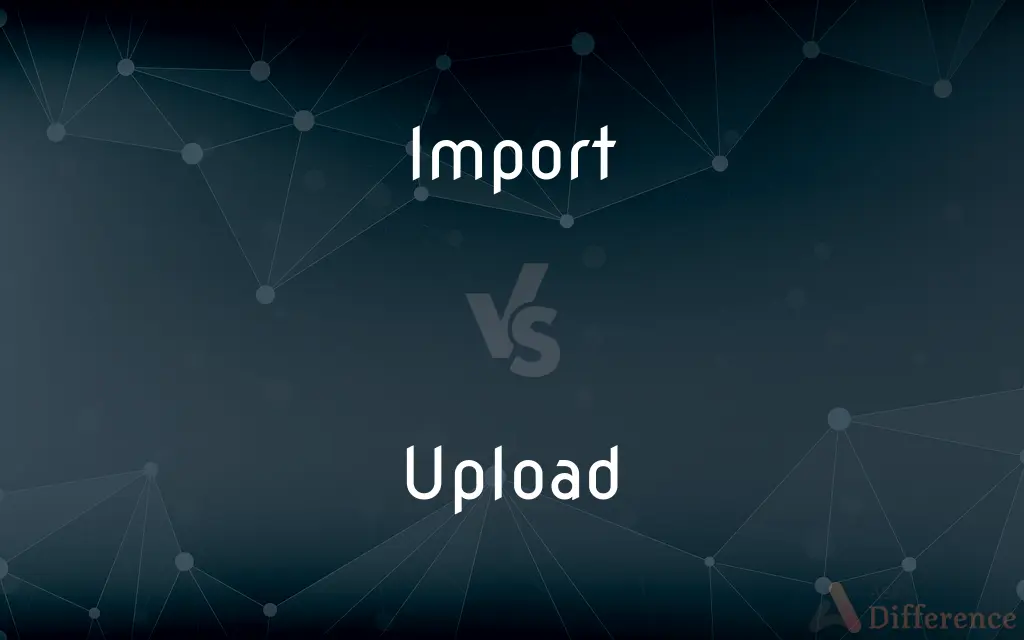Import vs. Upload — What's the Difference?
By Tayyaba Rehman & Fiza Rafique — Updated on March 11, 2024
Importing involves bringing data into a software application from an external source, while uploading refers to transferring data from a local system to a remote server or cloud service.

Difference Between Import and Upload
Table of Contents
ADVERTISEMENT
Key Differences
Importing data is a process used within software applications to integrate information from external sources, such as other applications or files, into the current working environment. This process often involves data conversion or mapping to fit the new application's format or structure. Whereas, uploading is the action of sending data from a user's local computer or device to a remote system, such as a server or cloud storage, typically over the internet.
While importing is focused on the integration and usability of data within a software application or system, ensuring compatibility and maintaining the integrity of the data, uploading is primarily concerned with the movement of data from a local to a remote location for storage, sharing, or further processing.
Import functions are commonly found in software applications that require data from different sources to perform tasks, such as spreadsheets, databases, and content management systems. On the other hand, uploading is a fundamental process in web applications, cloud services, and online platforms, enabling users to store files online, share content, or submit information through web forms.
In the context of data management, importing allows users to enrich or update their applications with additional data, providing more comprehensive insights or functionality. Conversely, uploading is essential for backing up data, accessing files from multiple devices, or making content accessible to others on the internet.
Both processes are critical in today's digital landscape, with importing enhancing the functionality and utility of software applications through data integration, and uploading facilitating global connectivity, content sharing, and cloud-based collaboration.
ADVERTISEMENT
Comparison Chart
Purpose
To integrate external data into an application
To transfer data to a remote server
Focus
Data integration and compatibility
Data movement and storage
Common Uses
Data analysis, content management systems
Cloud storage, web hosting, content sharing
Required Action
Mapping or conversion of data
Sending data over a network
Outcome
Enhanced functionality of an application
Data stored or accessible remotely
Compare with Definitions
Import
Involves converting or mapping data to a compatible format.
She imported the financial reports into the accounting software after format adjustments.
Upload
Enables content sharing and accessibility.
By uploading his music online, he could reach a global audience.
Import
Essential for updating and enriching applications.
Regularly importing updated inventory data helps in maintaining accurate stock levels.
Upload
A key step in backing up data online.
Uploading important documents to cloud storage serves as a backup in case of data loss.
Import
The process of integrating external data with existing data.
Importing sales data into the analytics platform provided deeper insights.
Upload
The process of sending data over the internet to a specific location.
Uploading photos to the online gallery allowed her to share them with family.
Import
To bring data into a software application from an external source.
He imported the client list into the new CRM system for better management.
Upload
Often involves selecting files and initiating the transfer.
She uploaded her resume to the job portal as part of the application process.
Import
A feature in many applications for data integration.
The import function in the database software streamlined the data consolidation process.
Upload
To transfer data from a local device to a remote server.
He uploaded the project files to the cloud storage for team access.
Import
An import in the receiving country is an export from the sending country. Importation and exportation are the defining financial transactions of international trade.In international trade, the importation and exportation of goods are limited by import quotas and mandates from the customs authority.
Upload
Uploading refers to transmitting data from one computer system to another through means of a network. Common methods of uploading include: uploading via web browsers, FTP clients], and terminals (SCP/SFTP).
Import
To bring or carry in from an outside source, especially to bring in (goods or materials) from a foreign country for trade or sale.
Upload
Transfer (data) from one computer to another, typically to one that is larger or remote from the user or functioning as a server
Software is uploaded and downloaded
You can upload your prepared text
Import
(Computers) To receive (data) into one program from another.
Upload
An act or process of uploading data
They are also adding the ability to pause an upload if you need to go off and do something else
The site allowed the upload of videos
Import
To carry or hold the meaning of; signify
Had trouble understanding what the strange word imported.
Upload
To transfer (data or programs) from a peripheral computer or device to a central computer or website.
Import
To express or make known
The news imported by their letter.
Upload
To upload data or a program.
Import
To betoken or indicate
A high inflation rate importing hard times for the consumer.
Upload
A file that is uploaded.
Import
Something imported
Levied a tax on imports from overseas.
Upload
An instance of uploading data or a program.
Import
The act or occupation of importing goods or materials.
Upload
To transfer data to a computer on a network, especially to a server on the Internet.
You will have to convert your photograph to a jpg format if you wish to upload it.
Import
Meaning; signification
The import of his statement is ambiguous.
Upload
Such a file transfer.
Import
Importance; significance
A legal decision of far-reaching import.
Upload
Transfer a file or program to a central computer from a smaller computer or a computer at a remote location
Import
(countable) Something brought in from an exterior source, especially for sale or trade.
Import
(uncountable) The practice of importing.
Import
(uncountable) Significance, importance.
It was a matter of great import.
Import
A foreigner playing in a sports league.
Import
(transitive) To bring (something) in from a foreign country, especially for sale or trade.
Import
(transitive) To load a file into a software application from another version or system.
How can I import files from older versions of this application?
Import
(intransitive) To be important; to be significant; to be of consequence.
Import
(transitive) To be of importance to (someone or something).
Import
(transitive) To be incumbent on (someone to do something).
Import
(transitive) To be important or crucial to (that something happen).
Import
(transitive) To mean, signify.
Import
To express, to imply.
Import
To bring in from abroad; to introduce from without; especially, to bring (wares or merchandise) into a place or country from a foreign country, in the transactions of commerce; - opposed to export. We import teas from China, coffee from Brazil, etc.
Import
To carry or include, as meaning or intention; to imply; to signify.
Every petition . . . doth . . . always import a multitude of speakers together.
Import
To be of importance or consequence to; to have a bearing on; to concern.
I have a motion much imports your good.
If I endure it, what imports it you?
Import
To signify; to purport; to be of moment.
Import
Merchandise imported, or brought into a country from without its boundaries; - generally in the plural, opposed to exports.
I take the imports from, and not the exports to, these conquests, as the measure of these advantages which we derived from them.
Import
That which a word, phrase, or document contains as its signification or intention or interpretation of a word, action, event, and the like.
Import
Importance; weight; consequence.
Most serious design, and the great import.
Import
Commodities (goods or services) bought from a foreign country
Import
An imported person brought from a foreign country;
The lead role was played by an import from Sweden
They are descendants of indentured importees
Import
The message that is intended or expressed or signified;
What is the meaning of this sentence
The significance of a red traffic light
The signification of Chinese characters
The import of his announcement was ambigtuous
Import
A meaning that is not expressly stated but can be inferred;
The significance of his remark became clear only later
The expectation was spread both by word and by implication
Import
Having important effects or influence;
Decisions of great consequence are made by the president himself
Virtue is of more moment that security
Import
Bring in from abroad
Import
Indicate or signify;
I'm afraid this spells trouble!
Common Curiosities
How do import and upload differ in terms of data handling?
Importing focuses on integrating and making data usable within an application, while uploading is about moving data to a remote location for storage or sharing.
What is the purpose of uploading data?
The purpose of uploading data is to transfer it from a local system to a remote server or cloud service for storage, sharing, or further processing.
Is importing data a one-time process?
Importing can be a one-time process or ongoing, depending on the needs of the application and the availability of new or updated data.
How does uploading affect data security?
Uploading data to a remote server involves risks, so it's important to use secure, reputable services and maintain good cybersecurity practices to protect the data.
Can uploaded data be accessed immediately?
Yes, uploaded data can usually be accessed immediately, depending on the platform and any necessary processing or approval steps.
What are common file formats for uploading?
Common file formats for uploading include JPEG for images, PDF for documents, and MP3 for audio, among others, depending on the specific platform and purpose.
Can you upload data offline?
Uploading requires an internet connection, as it involves transferring data to a remote server or cloud service.
What does it mean to import data?
Importing data means integrating information from an external source into a software application, ensuring compatibility and functionality within the new environment.
Can you import data without converting it?
Importing often requires some level of conversion or mapping to ensure compatibility with the new application, although some formats may be directly supported.
Why is uploading important?
Uploading is important for backing up data, sharing content with others, and enabling access to files from anywhere through the internet.
Can any type of data be imported into any software?
Not all data types are directly compatible with all software; importing may require converting the data into a format supported by the application.
Does importing data overwrite existing data?
Importing data can overwrite existing data if specifically intended to update or replace it; otherwise, it may be added as new data.
What tools are needed for importing data?
Tools for importing data can range from built-in import functions in software applications to specialized data conversion or migration software.
How do I know if my data has been successfully uploaded?
Successful uploads are typically confirmed by the platform or service through a notification or by making the uploaded content visible.
Are there limitations to what can be imported or uploaded?
Limitations may include file size, format restrictions, and compatibility issues, depending on the software or platform being used.
Share Your Discovery

Previous Comparison
Littering vs. Loitering
Next Comparison
Remainder vs. ReminderAuthor Spotlight
Written by
Tayyaba RehmanTayyaba Rehman is a distinguished writer, currently serving as a primary contributor to askdifference.com. As a researcher in semantics and etymology, Tayyaba's passion for the complexity of languages and their distinctions has found a perfect home on the platform. Tayyaba delves into the intricacies of language, distinguishing between commonly confused words and phrases, thereby providing clarity for readers worldwide.
Co-written by
Fiza RafiqueFiza Rafique is a skilled content writer at AskDifference.com, where she meticulously refines and enhances written pieces. Drawing from her vast editorial expertise, Fiza ensures clarity, accuracy, and precision in every article. Passionate about language, she continually seeks to elevate the quality of content for readers worldwide.















































